Starting from:
$14.95
Watergate: Pardon of Richard Nixon by President Ford Documents - Download
Watergate: Pardon of Richard Nixon by President Ford Documents
4,321 pages of documents related to the pardon of Richard Nixon on September 8, 1974, by President Gerald Ford.
The documents give an extensive view of the decision and its aftermath of President Ford granting, "..a full, free, and absolute pardon unto Richard Nixon for all offenses against the United States which he, Richard Nixon, has committed or may have committed or taken part in during the period from January 20, 1969 through August 9, 1974."
The Nixon pardon was controversial. Some critics ridiculed the decision and claimed a "corrupt bargain" had been struck between the men: that Ford's pardon was granted in exchange for Nixon's resignation, elevating Ford to the presidency. Ford's first press secretary and close friend Jerald terHorst resigned his post in protest after the pardon.
After the smoking gun tape became public on August 5, 1974, Nixon's possibility of surviving impeachment by the House, then removal by the Senate had disappeared). Nixon's jeopardy from criminal charges did not end with his August 9, 1974 resignation from office. President Ford’s first press conference on August 28, 1974 was dominated by questions about Richard Nixon. President Ford asked his White House Counsel Phil Bunchen to quietly look into legal precedents for Presidential pardons. Benton Becker, a lawyer who had been involved in preparing for Ford’s Vice-Presidential confirmation, assisted with the research. After considering all of the research and opinions gathered, on September 7 Ford made the decision to pardon the former President.
Ford's presidency would by significantly marked by the controversial pardon. In an editorial at the time, The New York Times stated that the Nixon pardon was a "profoundly unwise, divisive, and unjust act" that in a stroke had destroyed the new president's "credibility as a man of judgment, candor, and competence". Many believe the controversy was one of the major reasons Ford lost the election of 1976. Ford's approval rating dropped from 71% to 50% following the pardon. Allegations of a secret deal made with Ford, promising a pardon in return for Nixon's resignation, led Ford to testify before the House Judiciary Committee on October 17, 1974. At the time and later in his memoirs, President Ford strongly denied that there was any “deal” to trade a pardon for a Presidential resignation.
The John F. Kennedy Library Foundation presented its 2001 Profile in Courage Award to Gerald Ford for his 1974 pardon of Nixon. In pardoning Nixon, said the foundation, Ford placed his love of country ahead of his own political future and brought needed closure to the divisive Watergate affair. “I was one of those who spoke out against his action then,” Senator Ted Kennedy said at the presentation. “But time has a way of clarifying past events, and now we see that President Ford was right. His courage and dedication to our country made it possible for us to begin the process of healing and put the tragedy of Watergate behind us. He eminently deserves this award, and we are proud of his achievement.”
Materials include
WHITE HOUSE GENERAL DOCUMENTS
515 pages of general White House documents from the Ford Presidential Library concerning the Pardon. Includes:
An August 28, 1974 letter from White House counsel Leonard Garment to White House Counsel Philip Bunchen covering the issues to consider involving giving a pardon to Nixon.
The Reading Copy of President Ford's Pardon Message, September 8, 1974.
Special Counsel to President Ford Benton Becker written account of events leading to the pardon, starting from the day before Ford was sworn in as president.
A report from White House Office of Correspondence Director Anne Higgins, giving the count of pro and con, support and opposition letters sent to the White House on various subjects including pardoning President Nixon.
A Letter from Henry B Milnes Elementary School student Anthony Ferreira, telling Ford he thinks he the president is half right and half wrong.
White House Press Conferences September 10, 1974 to October 8, 1974.
PRESIDENT GERALD R. FORD’S HANDWRITTEN REFLECTIONS (1977 OR 1978) ON RICHARD NIXON'S PLACE IN HISTORY
While writing his autobiography, A Time to Heal (New York Harper & Row, 1979), President Gerald R. Ford composed a series of personal reflections, these pages in Ford's hand cover his view of Richard Nixon's place in history.
PHILIP W. BUCHEN - COUNSEL TO THE PRESIDENT, OFFICE OF COUNSEL TO THE PRESIDENT - PAPERS
2,361 pages of material taken from The Philip W. Buchen Files at the Ford Presidential Library.
Includes advice given to the President about Richard Nixon, correspondences, alternative speeches announcing the pardon of Nixon. When Gerald Ford succeeded to the Presidency on August 9, 1974, one of his first acts was to appoint his long-time friend and former law partner Philip Buchen as chief White House legal advisor and give the position Cabinet status. During his administration, Ford relied upon Buchen for advice on a wide range of issues, legislation, and actions. Much of the material on the pardon concerns attempts to defend Ford's decision in subsequent press conferences and the hearings of the House Subcommittee on Criminal Justice (also known as the Hungate Subcommittee). Included is correspondence with Congressman William Hungate and other members of the subcommittee, transcripts, background information, and briefing materials.
BENTON L. BECKER - ATTORNEY AND ADVISER TO THE PRESIDENT - PAPERS
Although not a member of Ford's White House staff, Benton L. Becker played an integral role in some of the most important events of Gerald Ford's career, including the investigation of Associate Supreme Court Justice William O. Douglas, Ford's confirmation as Vice President, the Nixon pardon, and the disposition of Nixon's papers. In August 1974, Becker took a leave of absence from his active law practice to assist Ford during the presidential transition. Becker made several recommendations for the disposition of President Nixon's papers, and was integral in stopping their destruction or shipment to Nixon’s home in San Clemente. In September 1974, President Ford and Philip Buchen, counsel to the President, selected Becker to negotiate a pardon agreement with ex-President Nixon. Becker performed the legal research to determine Ford's authority to pardon Nixon. Ford and Buchen also instructed Becker to obtain an agreement regarding the possession and control of Nixon's papers and tapes, and they asked Becker to assess Nixon's mental and physical condition. Becker's papers document these assignments. Becker worked on drafting of a statement of acceptance of the pardon by former president Nixon.
RON NESSEN - PRESS SECRETARY TO THE PRESIDENT - PAPERS
395 pages from the Ron Nessen Papers at the Ford Presidential Library, related to the Nixon Pardon.
JOHN MARSH - COUNSELLOR TO THE PRESIDENT - PAPERS
638 pages from the John Marsh Files at the Ford Presidential Library. John Marsh was a senior advisor who oversaw the White House Congressional Relations and Public Liaison Offices. He worked on President Ford's preparations to testify before a congressional committee concerning the Nixon pardon.
AUDIO RECORDING PRESIDENT GERALD FORD TESTIMONY TO HOUSE SUBCOMMITTEE ON CRIMINAL JUSTICE
Several Representatives requested answers to specific questions regarding the pardon and the circumstances surrounding it. On October 17, 1974, President Ford appeared on Capitol Hill before the House Judiciary Committee’s Subcommittee on Criminal Justice (Hungate Committee), becoming the first sitting President to give sworn congressional testimony. He delivered an opening statement and answered questions posed by the committee members regarding when and with whom he had discussed the pardon, and why he decided to grant it.
Supporting material includes:
SPECIAL PROSECUTOR LEON JAWORSKI OFFICE'S PRESENTMENT FOR A CRIMINAL INDICTMENT OF RICHARD NIXON
A draft of a presentment of a grand jury criminal indictment of Richard Nixon by Special Prosecutor Leon Jaworski's office. The criminal indictment, approved by a grand jury, against President Nixon on four criminal counts: bribery, conspiracy, obstruction of justice and obstruction of a criminal investigation. Jaworski decided to let Congress decide how to proceed against Nixon instead of directly indicting President Nixon. Nixon subsequently resigned and was pardoned by his successor, Gerald Ford. This draft was not available to the public until October 11, 2018 when its released was ordered by Chief Judge Beryl A. Howell, United States District Court for the District of Columbia.
"WATERGATE ROAD MAP"
“Grand Jury Report and Recommendation Concerning Transmission of Evidence to the House of Representatives,” also known as the Watergate Road Map. The Road Map consists of a two-page summary, a set of 53 numbered statements of fact acting as a referral for the impeachment of President Richard Nixon. This document was not unsealed until October 11, 2018 when its released was ordered by Chief Judge Beryl A. Howell, United States District Court for the District of Columbia.
HOUSE OF REPRESENTATIVES REPORT ON THE PARDON OF RICHARD NIXON HEARINGS
Report on the hearing, Pardon of Richard M. Nixon, And Related Matters, Hearings Before the Subcommittee on Criminal Justice of the Committee on the Judiciary House of Representatives, Ninety-Third Congress, Second Session on Bills and Resolutions that Seek to Insure Public Access to Information Relative to Watergate And its Related Activities, September 24, October 1 and 17, 1974.
OPINION OF THE DEPARTMENT OF JUSTICE OFFICE OF LEGAL COUNSEL PRESIDENTIAL OR LEGISLATIVE PARDON OF THE PRESIDENT (MONDAY, AUGUST 5, 1974)
A 1974 Justice Department memo, by Mary C. Lawton Acting Assistant Attorney General Office of Legal Counsel, that cites a “fundamental rule that no one may be a judge in his own case," and thus means "the president cannot pardon himself.”
BURDICK V. UNITED STATES, 236 U.S. 79 (1915)
A copy of the Supreme Court decision Burdick v. United States, in which Supreme Court Justice Joseph McKenna wrote that a pardoned man must introduce the pardon into court proceedings, otherwise the pardon must be disregarded by the court. To do this, the pardoned man must accept the pardon. If a pardon is rejected, it cannot be forced upon its subject. A pardon carries an 'imputation of guilt', and accepting a pardon is 'an admission of guilt'. In his book "How the Nixon Pardon Strained a Presidential Friendship," Patrick Flanary wrote that after Ford left the White House, he privately justified his pardon of Richard Nixon with the Burdick decision.
THE PRESIDENT’S PARDON POWER AND LEGAL EFFECTS ON COLLATERAL CONSEQUENCES (2016)
A report by the Congressional Research Service. This report reviews the text and jurisprudence of the Pardon Clause of the U.S. Constitution, as well as the types of pardons the clemency power includes, when pardons may be issued, and how pardons are granted. The remainder of the report analyzes the effect of a presidential pardon on collateral consequences.
AN OVERVIEW OF THE PRESIDENTIAL PARDONING POWER (2009)
A report by the Congressional Research Service. This report provides an overview of the scope of the President’s pardoning power, the legal effects of a pardon, and the procedures that have traditionally been adhered to in the consideration of requests for pardons.
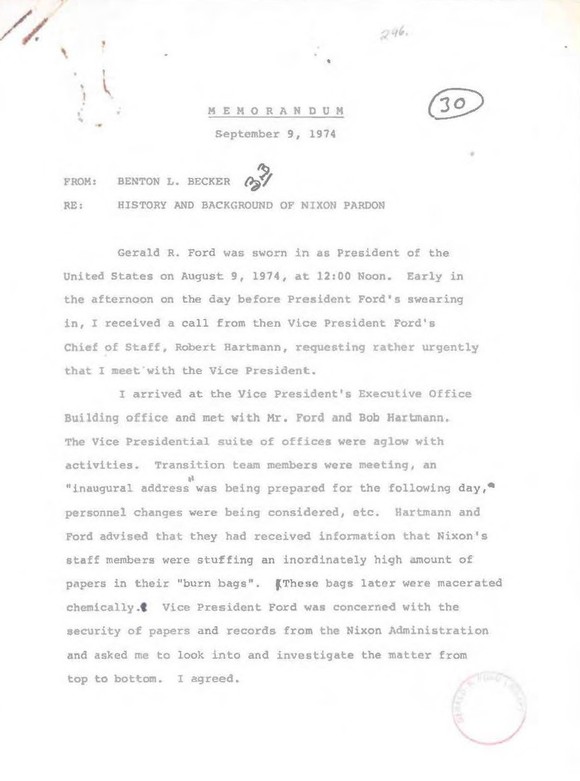
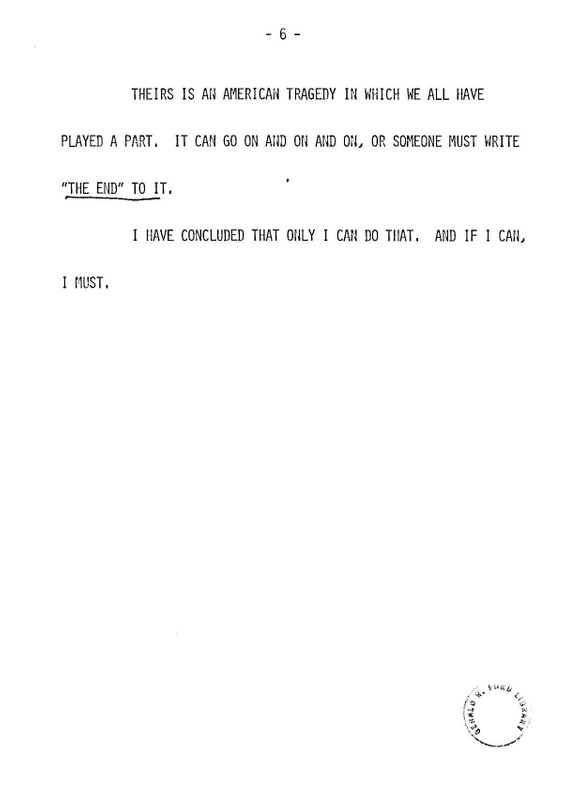
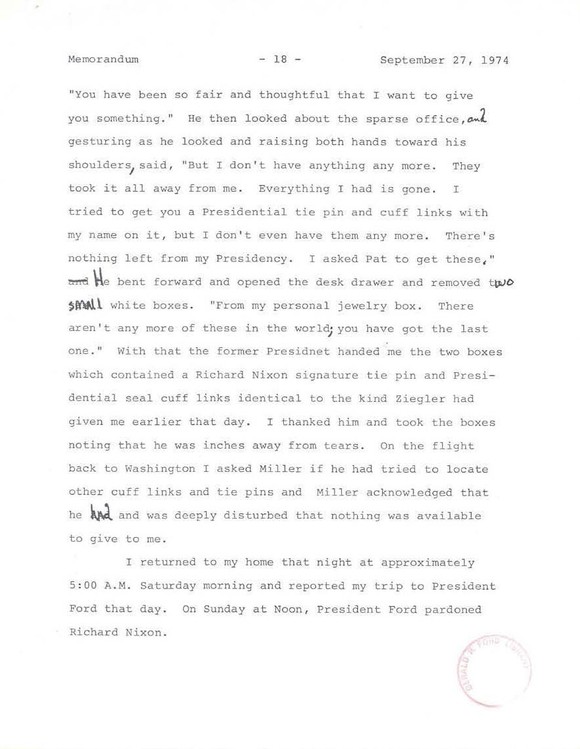
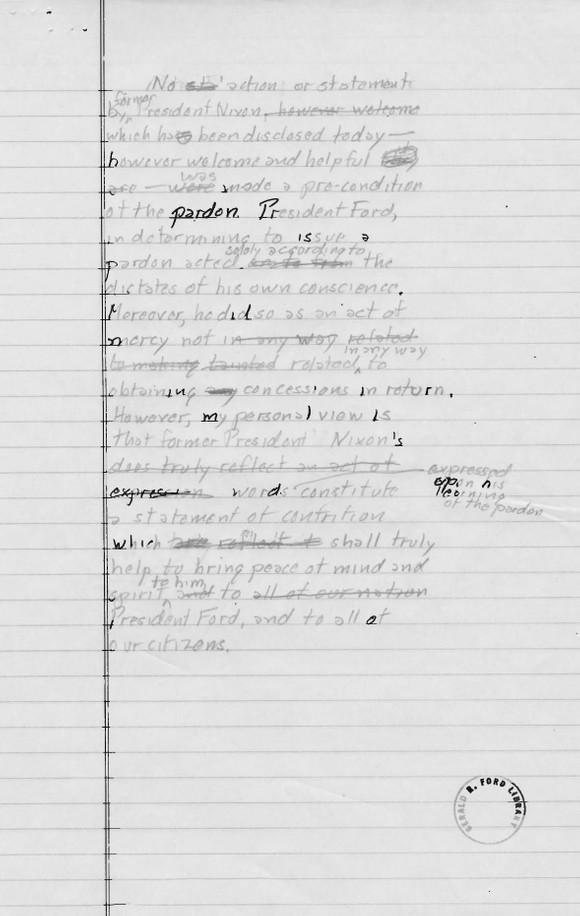
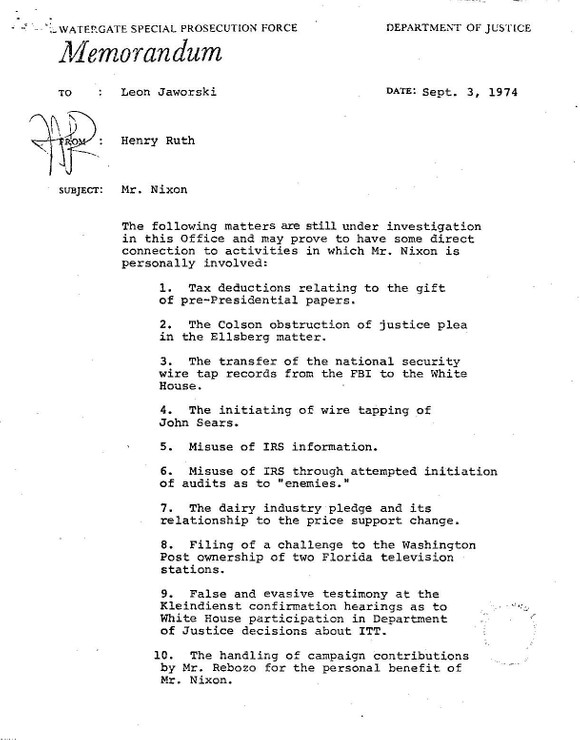

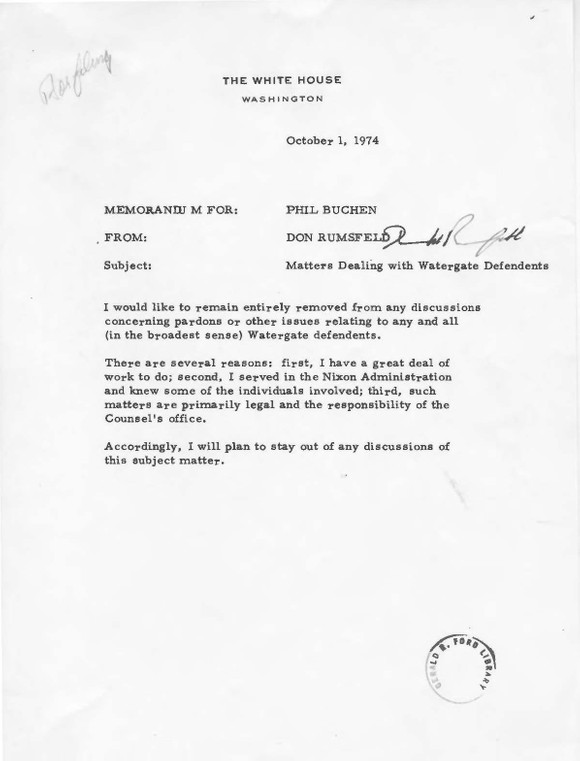
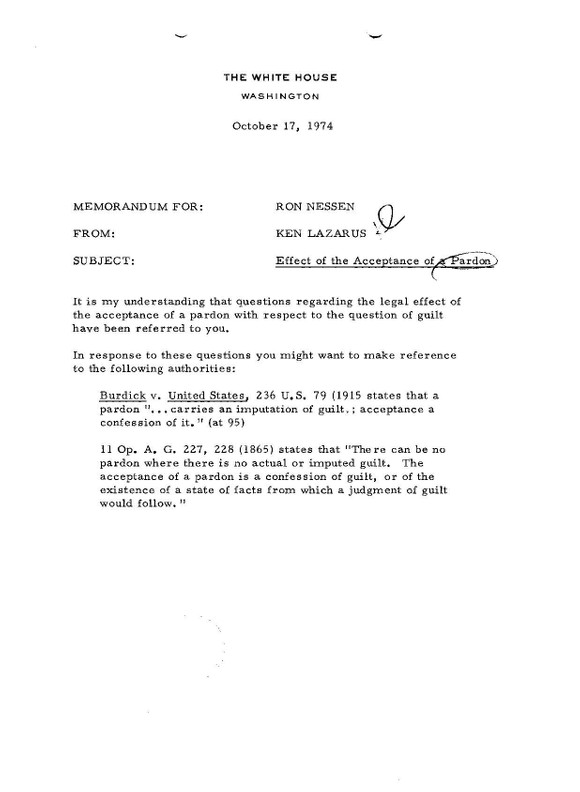

4,321 pages of documents related to the pardon of Richard Nixon on September 8, 1974, by President Gerald Ford.
The documents give an extensive view of the decision and its aftermath of President Ford granting, "..a full, free, and absolute pardon unto Richard Nixon for all offenses against the United States which he, Richard Nixon, has committed or may have committed or taken part in during the period from January 20, 1969 through August 9, 1974."
The Nixon pardon was controversial. Some critics ridiculed the decision and claimed a "corrupt bargain" had been struck between the men: that Ford's pardon was granted in exchange for Nixon's resignation, elevating Ford to the presidency. Ford's first press secretary and close friend Jerald terHorst resigned his post in protest after the pardon.
After the smoking gun tape became public on August 5, 1974, Nixon's possibility of surviving impeachment by the House, then removal by the Senate had disappeared). Nixon's jeopardy from criminal charges did not end with his August 9, 1974 resignation from office. President Ford’s first press conference on August 28, 1974 was dominated by questions about Richard Nixon. President Ford asked his White House Counsel Phil Bunchen to quietly look into legal precedents for Presidential pardons. Benton Becker, a lawyer who had been involved in preparing for Ford’s Vice-Presidential confirmation, assisted with the research. After considering all of the research and opinions gathered, on September 7 Ford made the decision to pardon the former President.
Ford's presidency would by significantly marked by the controversial pardon. In an editorial at the time, The New York Times stated that the Nixon pardon was a "profoundly unwise, divisive, and unjust act" that in a stroke had destroyed the new president's "credibility as a man of judgment, candor, and competence". Many believe the controversy was one of the major reasons Ford lost the election of 1976. Ford's approval rating dropped from 71% to 50% following the pardon. Allegations of a secret deal made with Ford, promising a pardon in return for Nixon's resignation, led Ford to testify before the House Judiciary Committee on October 17, 1974. At the time and later in his memoirs, President Ford strongly denied that there was any “deal” to trade a pardon for a Presidential resignation.
The John F. Kennedy Library Foundation presented its 2001 Profile in Courage Award to Gerald Ford for his 1974 pardon of Nixon. In pardoning Nixon, said the foundation, Ford placed his love of country ahead of his own political future and brought needed closure to the divisive Watergate affair. “I was one of those who spoke out against his action then,” Senator Ted Kennedy said at the presentation. “But time has a way of clarifying past events, and now we see that President Ford was right. His courage and dedication to our country made it possible for us to begin the process of healing and put the tragedy of Watergate behind us. He eminently deserves this award, and we are proud of his achievement.”
Materials include
WHITE HOUSE GENERAL DOCUMENTS
515 pages of general White House documents from the Ford Presidential Library concerning the Pardon. Includes:
An August 28, 1974 letter from White House counsel Leonard Garment to White House Counsel Philip Bunchen covering the issues to consider involving giving a pardon to Nixon.
The Reading Copy of President Ford's Pardon Message, September 8, 1974.
Special Counsel to President Ford Benton Becker written account of events leading to the pardon, starting from the day before Ford was sworn in as president.
A report from White House Office of Correspondence Director Anne Higgins, giving the count of pro and con, support and opposition letters sent to the White House on various subjects including pardoning President Nixon.
A Letter from Henry B Milnes Elementary School student Anthony Ferreira, telling Ford he thinks he the president is half right and half wrong.
White House Press Conferences September 10, 1974 to October 8, 1974.
PRESIDENT GERALD R. FORD’S HANDWRITTEN REFLECTIONS (1977 OR 1978) ON RICHARD NIXON'S PLACE IN HISTORY
While writing his autobiography, A Time to Heal (New York Harper & Row, 1979), President Gerald R. Ford composed a series of personal reflections, these pages in Ford's hand cover his view of Richard Nixon's place in history.
PHILIP W. BUCHEN - COUNSEL TO THE PRESIDENT, OFFICE OF COUNSEL TO THE PRESIDENT - PAPERS
2,361 pages of material taken from The Philip W. Buchen Files at the Ford Presidential Library.
Includes advice given to the President about Richard Nixon, correspondences, alternative speeches announcing the pardon of Nixon. When Gerald Ford succeeded to the Presidency on August 9, 1974, one of his first acts was to appoint his long-time friend and former law partner Philip Buchen as chief White House legal advisor and give the position Cabinet status. During his administration, Ford relied upon Buchen for advice on a wide range of issues, legislation, and actions. Much of the material on the pardon concerns attempts to defend Ford's decision in subsequent press conferences and the hearings of the House Subcommittee on Criminal Justice (also known as the Hungate Subcommittee). Included is correspondence with Congressman William Hungate and other members of the subcommittee, transcripts, background information, and briefing materials.
BENTON L. BECKER - ATTORNEY AND ADVISER TO THE PRESIDENT - PAPERS
Although not a member of Ford's White House staff, Benton L. Becker played an integral role in some of the most important events of Gerald Ford's career, including the investigation of Associate Supreme Court Justice William O. Douglas, Ford's confirmation as Vice President, the Nixon pardon, and the disposition of Nixon's papers. In August 1974, Becker took a leave of absence from his active law practice to assist Ford during the presidential transition. Becker made several recommendations for the disposition of President Nixon's papers, and was integral in stopping their destruction or shipment to Nixon’s home in San Clemente. In September 1974, President Ford and Philip Buchen, counsel to the President, selected Becker to negotiate a pardon agreement with ex-President Nixon. Becker performed the legal research to determine Ford's authority to pardon Nixon. Ford and Buchen also instructed Becker to obtain an agreement regarding the possession and control of Nixon's papers and tapes, and they asked Becker to assess Nixon's mental and physical condition. Becker's papers document these assignments. Becker worked on drafting of a statement of acceptance of the pardon by former president Nixon.
RON NESSEN - PRESS SECRETARY TO THE PRESIDENT - PAPERS
395 pages from the Ron Nessen Papers at the Ford Presidential Library, related to the Nixon Pardon.
JOHN MARSH - COUNSELLOR TO THE PRESIDENT - PAPERS
638 pages from the John Marsh Files at the Ford Presidential Library. John Marsh was a senior advisor who oversaw the White House Congressional Relations and Public Liaison Offices. He worked on President Ford's preparations to testify before a congressional committee concerning the Nixon pardon.
AUDIO RECORDING PRESIDENT GERALD FORD TESTIMONY TO HOUSE SUBCOMMITTEE ON CRIMINAL JUSTICE
Several Representatives requested answers to specific questions regarding the pardon and the circumstances surrounding it. On October 17, 1974, President Ford appeared on Capitol Hill before the House Judiciary Committee’s Subcommittee on Criminal Justice (Hungate Committee), becoming the first sitting President to give sworn congressional testimony. He delivered an opening statement and answered questions posed by the committee members regarding when and with whom he had discussed the pardon, and why he decided to grant it.
Supporting material includes:
SPECIAL PROSECUTOR LEON JAWORSKI OFFICE'S PRESENTMENT FOR A CRIMINAL INDICTMENT OF RICHARD NIXON
A draft of a presentment of a grand jury criminal indictment of Richard Nixon by Special Prosecutor Leon Jaworski's office. The criminal indictment, approved by a grand jury, against President Nixon on four criminal counts: bribery, conspiracy, obstruction of justice and obstruction of a criminal investigation. Jaworski decided to let Congress decide how to proceed against Nixon instead of directly indicting President Nixon. Nixon subsequently resigned and was pardoned by his successor, Gerald Ford. This draft was not available to the public until October 11, 2018 when its released was ordered by Chief Judge Beryl A. Howell, United States District Court for the District of Columbia.
"WATERGATE ROAD MAP"
“Grand Jury Report and Recommendation Concerning Transmission of Evidence to the House of Representatives,” also known as the Watergate Road Map. The Road Map consists of a two-page summary, a set of 53 numbered statements of fact acting as a referral for the impeachment of President Richard Nixon. This document was not unsealed until October 11, 2018 when its released was ordered by Chief Judge Beryl A. Howell, United States District Court for the District of Columbia.
HOUSE OF REPRESENTATIVES REPORT ON THE PARDON OF RICHARD NIXON HEARINGS
Report on the hearing, Pardon of Richard M. Nixon, And Related Matters, Hearings Before the Subcommittee on Criminal Justice of the Committee on the Judiciary House of Representatives, Ninety-Third Congress, Second Session on Bills and Resolutions that Seek to Insure Public Access to Information Relative to Watergate And its Related Activities, September 24, October 1 and 17, 1974.
OPINION OF THE DEPARTMENT OF JUSTICE OFFICE OF LEGAL COUNSEL PRESIDENTIAL OR LEGISLATIVE PARDON OF THE PRESIDENT (MONDAY, AUGUST 5, 1974)
A 1974 Justice Department memo, by Mary C. Lawton Acting Assistant Attorney General Office of Legal Counsel, that cites a “fundamental rule that no one may be a judge in his own case," and thus means "the president cannot pardon himself.”
BURDICK V. UNITED STATES, 236 U.S. 79 (1915)
A copy of the Supreme Court decision Burdick v. United States, in which Supreme Court Justice Joseph McKenna wrote that a pardoned man must introduce the pardon into court proceedings, otherwise the pardon must be disregarded by the court. To do this, the pardoned man must accept the pardon. If a pardon is rejected, it cannot be forced upon its subject. A pardon carries an 'imputation of guilt', and accepting a pardon is 'an admission of guilt'. In his book "How the Nixon Pardon Strained a Presidential Friendship," Patrick Flanary wrote that after Ford left the White House, he privately justified his pardon of Richard Nixon with the Burdick decision.
THE PRESIDENT’S PARDON POWER AND LEGAL EFFECTS ON COLLATERAL CONSEQUENCES (2016)
A report by the Congressional Research Service. This report reviews the text and jurisprudence of the Pardon Clause of the U.S. Constitution, as well as the types of pardons the clemency power includes, when pardons may be issued, and how pardons are granted. The remainder of the report analyzes the effect of a presidential pardon on collateral consequences.
AN OVERVIEW OF THE PRESIDENTIAL PARDONING POWER (2009)
A report by the Congressional Research Service. This report provides an overview of the scope of the President’s pardoning power, the legal effects of a pardon, and the procedures that have traditionally been adhered to in the consideration of requests for pardons.









1 file (427.1MB)



